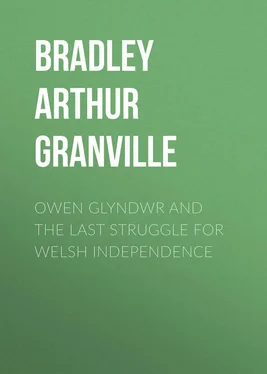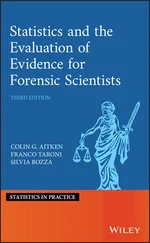Arthur Bradley - Owen Glyndwr and the Last Struggle for Welsh Independence
Здесь есть возможность читать онлайн «Arthur Bradley - Owen Glyndwr and the Last Struggle for Welsh Independence» — ознакомительный отрывок электронной книги совершенно бесплатно, а после прочтения отрывка купить полную версию. В некоторых случаях можно слушать аудио, скачать через торрент в формате fb2 и присутствует краткое содержание. Жанр: foreign_antique, foreign_prose, foreign_language, на английском языке. Описание произведения, (предисловие) а так же отзывы посетителей доступны на портале библиотеки ЛибКат.
- Название:Owen Glyndwr and the Last Struggle for Welsh Independence
- Автор:
- Жанр:
- Год:неизвестен
- ISBN:нет данных
- Рейтинг книги:5 / 5. Голосов: 1
-
Избранное:Добавить в избранное
- Отзывы:
-
Ваша оценка:
- 100
- 1
- 2
- 3
- 4
- 5
Owen Glyndwr and the Last Struggle for Welsh Independence: краткое содержание, описание и аннотация
Предлагаем к чтению аннотацию, описание, краткое содержание или предисловие (зависит от того, что написал сам автор книги «Owen Glyndwr and the Last Struggle for Welsh Independence»). Если вы не нашли необходимую информацию о книге — напишите в комментариях, мы постараемся отыскать её.
Owen Glyndwr and the Last Struggle for Welsh Independence — читать онлайн ознакомительный отрывок
Ниже представлен текст книги, разбитый по страницам. Система сохранения места последней прочитанной страницы, позволяет с удобством читать онлайн бесплатно книгу «Owen Glyndwr and the Last Struggle for Welsh Independence», без необходимости каждый раз заново искать на чём Вы остановились. Поставьте закладку, и сможете в любой момент перейти на страницу, на которой закончили чтение.
Интервал:
Закладка:
Thus perished the last representative of the long line of Welsh Princes that may be said to have had its rise with the sons of Cunedda eight centuries before. The last dim spark of Welsh independence flickered feebly for a few weeks, till the very recesses of Snowdonia, for almost the first time in history, gave back their echoes to the blast of English bugles, and the wild passes of Nant Francon and Llanberis felt the tramp of alien feet. Dafydd found himself alone, a hunted outlaw in the forests of the Vale of Clwyd. He was soon captured and taken to Shrewsbury, where a Parliament was then sitting. Llewelyn’s remains had been treated with doubtful logic and poor chivalry as a traitor. What treatment he would have met with at Edward’s hands as a prisoner we cannot know. But Dafydd could expect nothing but the worst and he received it. He was tried as an English baron at Shrewsbury and sentenced to be quartered, disembowelled, and beheaded. His quarters were distributed among four English cities, Winchester and York, it is said, quarrelling for the honour of his right shoulder, while his head was sent to moulder by his brother’s over the gateway of the Tower of London. A story runs that while his entrails were being burned his heart leaped from the flames and struck the executioner who was feeding them.
All resistance worthy of mention was now over in Wales. The six centuries or thereabouts of its history as a separate nation in whole or in part had closed. A new epoch was to open, and Edward was the man to mark the division between the past and the future in emphatic fashion. Hitherto, though statesmanlike in his views, he had been in actual deed both cruel and unjust to Wales, and allowed his agents to be still more so; but now that resistance was crushed he dropped the warrior and tyrant and showed himself the statesman that he was. Most of the Welshmen that had remained in arms received their pardons, though a few took service abroad. The King exacted no sanguinary vengeance, but followed, rather, the more merciful and practical course of providing against the chance of his Welsh subjects requiring it in future. He went to Wales with his Court and remained there for nearly three years. He made Rhuddlan his principal headquarters, rebuilding its ancient castle; and at Conway, Harlech, and Carnarvon, besides some less formidable fortresses, he left those masterpieces of defensive construction that have been the admiration of all subsequent ages. From Rhuddlan in due course he issued the famous statutes called by its name, which proclaimed at once the death-knell of Old Wales and the fact of its territorial fusion with the realm of England. The details of the settlement were laborious, and the spectacle of an English Court spending in all nearly three busy years in Wales is evidence of the thoroughness with which Edward did his work.
It is enough here to say that with the exception of modern Denbighshire, which was left in lordships, Edward carved North Wales into the present counties of Flint, Anglesey, Carnarvon, and Merioneth. Powys and South Wales being honeycombed with Anglo-Norman lordships and reconciled Welsh chieftains, he shrank probably from disentangling a confusion that brought no particular danger to himself, and from a course that would have embroiled him with the whole feudal interest of the Marches.
The still mainly Welsh districts, however, of Cardigan and Carmarthen, he had already, as we have seen, formed into counties. They were now, like those of the North, to be governed by lieutenants, sheriffs, and justices, and in all things to resemble English counties, except in the privilege of sending representatives to Parliament. Wales was kept separate from England, however, in so far as its immediate feudal lord was not the King of England, but the King’s eldest son; and the Principality of Wales at this time, it must be remembered, meant only the royal counties.
Edward’s laws for the conquered country were just and his intention not ungenerous. He reduced the rentals hitherto due to the Welsh Princes and listened patiently to the grievances of the people. He enacted that both in counties and lordships the old Welsh laws should be those of the Welsh so far as possible, and that justice should be administered in both languages, and he sent the Archbishop of Canterbury on a long visitation to take note of the destruction to churches perpetrated during the recent wars, and to arrange for their repair.
He was severe on the bards, it is true, but he did not slaughter them, as an old fiction asserts. Their wandering avocations were sternly repressed, and with the business that he had in hand it is not easy to see what other course he could have taken with men whose trade then chiefly consisted in recalling the wrongs of Wales and urging revenge. The whole business was concluded by a great tournament at Nevin, on the Carnarvon coast, which was attended by the flower of Welsh, English, and Gascon chivalry.
When the King returned to London after his long absence, he went with splendid ceremonial and a vast procession to the Tower and to Westminster Abbey, causing the regalia of the exterminated Welsh Princes and the skull of St. David to be borne before him. Nor must one omit mention of the immortal but grim joke which tradition says that he played upon the Welsh nobility before leaving the country. For does not every schoolboy know how, having promised them a Prince who was born in Wales and could speak no English, he sent Queen Eleanor to Carnarvon for the birth of Edward the Second?
A good deal can be said of the century that was to elapse before our story opens, but not much that is of vital import. In 1295, thirteen years after the conquest, Madoc ap Meredith, a connection of Llewelyn’s, made a last attempt to rouse the Welsh. It proved abortive, but was serious enough to stop Edward from going to France, and to take him down to Conway, where it is said that on a certain occasion a high tide cut him off from his men, and nearly delivered him into the hands of the insurgents.
It would be too much to say that the next hundred years in Wales were those of peace and prosperity. But by comparison with the past they might not untruly be called so. No serious friction occurred between the two races; while the long wars with France and constant broils with Scotland engrossed the attention of the Welsh aristocracy, both Norman and native. Nor, again, was it only the nobles and gentry that found respite from their domestic quarrels in a combined activity upon the unfortunate soil of France. Welsh soldiers as well as Welsh gentlemen served by thousands in the armies of England, and few people remember that about a third of the victorious army at Cressy were Welshmen. This long companionship in arms and partnership in almost unparallelled glories must have done something to lessen the instinctive antipathy with which the two peoples had from time immemorial regarded each other. Yet how much of the ancient enmity survived, only requiring some spark to kindle it, will be evident enough as I proceed to the main part of my story, and the doings of the indomitable Welshman who is its hero.
Конец ознакомительного фрагмента.
Текст предоставлен ООО «ЛитРес».
Прочитайте эту книгу целиком, купив полную легальную версию на ЛитРес.
Читать дальшеИнтервал:
Закладка:
Похожие книги на «Owen Glyndwr and the Last Struggle for Welsh Independence»
Представляем Вашему вниманию похожие книги на «Owen Glyndwr and the Last Struggle for Welsh Independence» списком для выбора. Мы отобрали схожую по названию и смыслу литературу в надежде предоставить читателям больше вариантов отыскать новые, интересные, ещё непрочитанные произведения.
Обсуждение, отзывы о книге «Owen Glyndwr and the Last Struggle for Welsh Independence» и просто собственные мнения читателей. Оставьте ваши комментарии, напишите, что Вы думаете о произведении, его смысле или главных героях. Укажите что конкретно понравилось, а что нет, и почему Вы так считаете.












